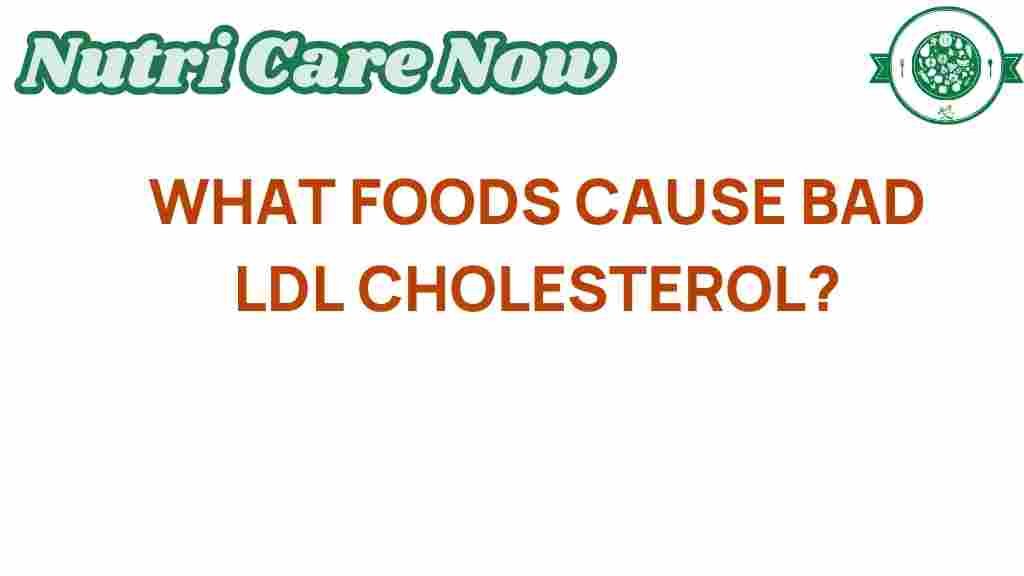Unraveling the Mystery: What Foods Fuel Bad LDL Cholesterol?
When it comes to heart health, understanding LDL cholesterol is vital. Often referred to as “bad” cholesterol, LDL cholesterol can lead to various health issues, including heart disease and stroke. The relationship between diet and LDL cholesterol levels is crucial, making informed food choices essential for anyone looking to maintain or improve their cardiovascular health. In this article, we will explore the foods that can elevate LDL cholesterol levels and how to make healthier dietary decisions.
The Basics of LDL Cholesterol
LDL cholesterol, or low-density lipoprotein cholesterol, is a type of fat that travels through your bloodstream. While your body needs some cholesterol to function properly, too much LDL can lead to the buildup of plaque in your arteries, increasing the risk of heart disease. It’s critical to monitor your cholesterol levels and understand how your nutrition plays a role.
Foods That Fuel Bad LDL Cholesterol
Understanding which foods contribute to high LDL cholesterol can empower you to make better choices. Here are the primary culprits:
- Saturated Fats: Found in animal products and some plant oils, saturated fats can increase LDL cholesterol levels significantly.
- Trans Fats: Often found in processed foods, trans fats are notorious for raising bad cholesterol levels while lowering good cholesterol.
- Processed Meats: Items like bacon, sausage, and deli meats are high in saturated fats and preservatives that can harm heart health.
- Full-Fat Dairy Products: Whole milk, cheese, and butter contain saturated fats that can raise LDL cholesterol levels.
- Fried Foods: Cooking oils high in trans fats, as well as the frying process itself, can contribute to increased bad cholesterol.
- Baked Goods: Many baked goods contain refined sugars and trans fats, which can negatively impact cholesterol levels.
- Fast Food: Typically high in saturated and trans fats, fast food choices can lead to higher LDL cholesterol.
The Role of Diet in Maintaining Heart Health
A balanced diet plays a significant role in maintaining low LDL cholesterol levels. Here are some dietary guidelines to help you promote heart health:
- Incorporate Healthy Fats: Replace saturated fats with unsaturated fats found in foods like olive oil, avocados, and nuts.
- Eat More Fiber: Soluble fiber found in oats, beans, lentils, and fruits can help lower cholesterol levels.
- Choose Lean Proteins: Opt for fish, poultry, and plant-based proteins like tofu and legumes instead of red or processed meats.
- Limit Added Sugars: Reducing sugar intake can benefit overall heart health and maintain balanced cholesterol levels.
- Increase Fruits and Vegetables: Aim for a variety of colorful produce to ensure a wide range of nutrients.
Step-by-Step Process for Improving LDL Cholesterol Through Diet
To effectively lower your LDL cholesterol levels through dietary changes, follow these steps:
Step 1: Evaluate Your Current Diet
Keep a food diary for a week. Note everything you eat and drink to identify sources of saturated and trans fats.
Step 2: Educate Yourself on Nutrition Labels
Learn how to read nutrition labels. Look for saturated fats and trans fats and choose products with lower amounts.
Step 3: Meal Planning
Create a meal plan that emphasizes whole foods and minimizes processed options. Focus on incorporating:
- Whole grains
- Fruits and vegetables
- Lean proteins
- Healthy fats
Step 4: Gradual Changes
Make gradual changes rather than attempting to overhaul your diet overnight. This approach leads to more sustainable habits.
Step 5: Regular Monitoring
Regularly check your cholesterol levels through blood tests. This helps you understand the effectiveness of your dietary changes.
Troubleshooting Tips for Dietary Changes
Making dietary changes can be challenging. Here are some troubleshooting tips to help you stay on track:
- Find Healthy Substitutes: If you love fried foods, try baking or grilling instead.
- Experiment with Recipes: Look for heart-healthy recipes that make use of whole foods and healthy fats.
- Stay Informed: Keep up with the latest research on nutrition and heart health to stay motivated.
- Seek Support: Join a community or find a buddy who is also focused on improving their heart health.
Conclusion
Understanding the foods that fuel bad LDL cholesterol is essential for anyone concerned about their heart health. By making informed food choices and adhering to a heart-healthy diet, you can effectively manage your cholesterol levels and reduce the risk of cardiovascular diseases. Remember, it’s not just about avoiding certain foods; it’s also about embracing a variety of nutritious foods that support your overall well-being.
For more information on healthy eating practices and heart health tips, check out this resource on heart-healthy diets. If you’re looking for specific dietary advice, it may be beneficial to consult with a nutritionist or healthcare provider.
By focusing on your nutrition and making conscious dietary choices, you can take significant steps toward improving your LDL cholesterol levels and enhancing your overall health. Remember, a healthy heart starts with a healthy plate!
This article is in the category Diet and created by NutriCareNow Team
